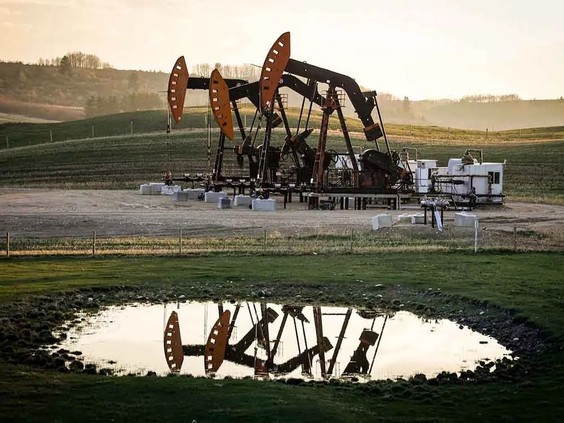World
Alberta Faces Budget Challenges Amid Falling Oil Prices

Alberta Premier Danielle Smith has warned that the province may face significant budget challenges due to a recent decline in oil prices. The price of benchmark U.S. West Texas Intermediate (WTI) crude oil has fallen nearly 10 percent since late July, closing at just below US$63 a barrel. This figure is almost $5 lower than the province’s budget expectations, which already projected a deficit exceeding $5 billion.
The situation is compounded by a forecast from the U.S. Energy Information Administration (EIA), which predicts that WTI prices will average only $54 a barrel between October and December, and drop to $47.77 per barrel next year. This outlook is largely attributed to increased oil supplies from OPEC+ countries and rising global inventory levels.
Implications for Alberta’s Economy
For the Alberta government, the current WTI price forecast of $68 a barrel is becoming increasingly difficult to achieve. Premier Smith commented, “I look at the WTI prices and the Western Canada Select prices virtually every day, and they’re terrible. We were looking at the potential of a $5 billion deficit at $68 WTI.” She emphasized the need for Albertans to prepare for a difficult budget year if prices continue to decline.
According to the EIA’s recent short-term energy outlook, expectations of falling prices are influenced by a decision from OPEC+ to increase production, restoring 547,000 barrels per day of previously idled output in September. The EIA also forecasts that Brent crude prices, which averaged $81 last year, will drop to $51 next year. Smith noted that while $65 per barrel is necessary for companies to cover costs and incentivize further investment, the unpredictability of oil prices poses a significant risk to Alberta’s budget.
Despite an anticipated increase in global oil demand of about 700,000 barrels per day in the coming years, the International Energy Agency indicates that supply is expected to grow even more substantially, leading to a supply-demand imbalance.
Financial Outlook and Revenue Impacts
The decline in oil prices translates directly to lower royalty and tax revenues for Alberta, with non-renewable resources expected to contribute 23 percent of total government revenue this year, equating to approximately $17 billion. Since the fiscal year began on April 1, benchmark U.S. oil prices have averaged $65 a barrel, which is $3 below the budget estimate. Every $1 decrease in WTI prices reduces government revenues by $750 million.
According to economist Moshe Lander from Concordia University, the province’s reliance on non-renewable resource revenue complicates its financial landscape. “The province lives and dies by non-renewable resource revenue,” Lander stated, suggesting that balancing the 2025-26 budget is unlikely under current conditions.
The Alberta government plans to release its first-quarter financial results next week, which will provide further insights into the impacts of lower commodity prices and economic uncertainties. Some analysts have pointed out positive factors, such as the narrowing price differential between WTI and Western Canada Select (WCS) heavy oil, which has the potential to bolster government revenues. Currently, the differential stands near $13 per barrel, with expectations that it could average $17 this fiscal year.
Despite these economic challenges, Premier Smith remains optimistic about the province’s future. She highlighted that the digital technology sector has seen growth, employing approximately 194,000 people, surpassing the 157,000 jobs directly related to oil and gas. Nonetheless, she acknowledged reports of declining drilling levels from the oilfield service sector, with the Canadian Association of Energy Contractors noting a 13 percent pullback in drilling activity in July compared to the previous year.
As Alberta navigates these turbulent economic waters, Premier Smith has stressed the importance of managing expectations. “It’s certainly not rosier than it was when we first put the budget forward,” she remarked, confirming that the government has prepared a conservative budget in light of ongoing uncertainty.
-

 Science3 months ago
Science3 months agoToyoake City Proposes Daily Two-Hour Smartphone Use Limit
-

 Top Stories3 months ago
Top Stories3 months agoPedestrian Fatally Injured in Esquimalt Collision on August 14
-

 Health3 months ago
Health3 months agoB.C. Review Reveals Urgent Need for Rare-Disease Drug Reforms
-

 Technology3 months ago
Technology3 months agoDark Adventure Game “Bye Sweet Carole” Set for October Release
-

 World3 months ago
World3 months agoJimmy Lai’s Defense Challenges Charges Under National Security Law
-

 Lifestyle3 months ago
Lifestyle3 months agoVictoria’s Pop-Up Shop Shines Light on B.C.’s Wolf Cull
-

 Technology3 months ago
Technology3 months agoKonami Revives Iconic Metal Gear Solid Delta Ahead of Release
-

 Technology3 months ago
Technology3 months agoApple Expands Self-Service Repair Program to Canada
-

 Technology3 months ago
Technology3 months agoSnapmaker U1 Color 3D Printer Redefines Speed and Sustainability
-

 Technology3 months ago
Technology3 months agoAION Folding Knife: Redefining EDC Design with Premium Materials
-

 Business3 months ago
Business3 months agoGordon Murray Automotive Unveils S1 LM and Le Mans GTR at Monterey
-

 Technology3 months ago
Technology3 months agoSolve Today’s Wordle Challenge: Hints and Answer for August 19









